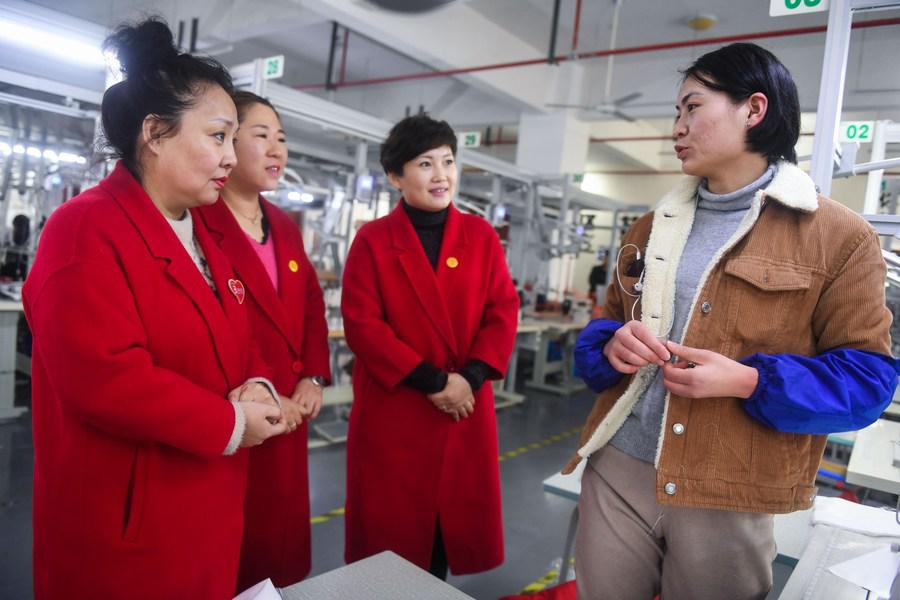"Mediation supermarket" streamlines social dispute resolution at primary level

Mediation volunteers talk with a worker while visiting a factory to help resolve disputes between employees and employers in Zhili Town in Huzhou, east China's Zhejiang Province, Feb. 27, 2019. (Xinhua/Xu Yu)
HANGZHOU, May 7 (Xinhua) -- Mired in a default repayment dispute for more than a year, Xie Lan got a satisfactory answer in only 10 days with the help of the mediation center in his county.
"I didn't expect mediation to be more efficient than litigation. The mediation center is really our 'worry-solving supermarket,'" Xie said.
Xie from Anji County in east China's Zhejiang Province and Shen Ming from the neighboring Anhui Province had business dealings for many years. In the past two years, Shen's business was not doing well, and she has delayed repayment to Xie of over 50,000 yuan (7,720 U.S. dollars) for more than a year. Xie, in response, filed a lawsuit.
"Litigation not only requires legal fees, but also takes time and energy. It takes at least two months for a verdict to be reached," Zhu Guoyan, who was in charge of mediation prior to the lawsuit, told Xie. "Even if a verdict is given, the other party may not pay back the money immediately."
Zhu said he would help Xie get his money back without going to court and persuaded Shen to repay the money in a timely manner.
"If you don't pay back the money, you will definitely lose the case. The record may have a negative impact on your credit. You could even be affected when trying to get loans or buying flight tickets," Zhu told Shen.
After several rounds of communication, Shen finally agreed to return the money. But because money was tight, she wanted to pay in installments, which Xie agreed to.
The civil lawsuit, which had already been brought to court, was thus successfully resolved through Zhu's professional and patient mediation.
"This was just the tip of the iceberg in our dealing with social disputes," Zhu said. "We will provide professional assistance no matter it involves neighborhood conflicts, labor and financial disputes, or people filing lawsuits against government."
Over the past six months, Zhu has successfully mediated 63 cases involving over 3.4 million yuan, and helped migrant workers to recover wages totaling more than 610,000 yuan.
Zhu said the mediation center provides people a platform to solve their worries and bail them out of difficulty. "Even if the conflict is complex, it does not have to be brought to court."
As long as a mediation agreement is confirmed by the judiciary, it is eligible for compulsory enforcement, according to Zhu.
Zhu, a former researcher of the Justice Bureau of Anji County, has been hired as a mediator of Anji's mediation center after retirement because he is proficient in law and warm-hearted. He is one of the nine mediators who are retirees from administrative and legal service positions.
The mediation center offers one-stop solutions for people with different needs, as they can consult with personnel from 18 authorities in areas including petition-handling, public security, human resources and social security agencies as well as courts and procuratorates, said Shen Gaofei, deputy head of Anji's mediation center.
At present, numerous mediation centers at village, township and county levels have been established to serve Zhejiang's 65 million population. Official statistics showed that in 2020, a total of 662,000 disputes were handled at county-level mediation centers, and 94.9 percent of those were settled.
Last year, the province introduced a digital system to track dispute-handling progress, making sure each and every dispute is responded to and improving the efficiency of mediation centers.
Solving disputes before they get out of hand has enhanced people's sense of happiness and security. The number of criminal cases registered in Zhejiang dropped from 666,800 in 2015 to 241,900 in 2020. Meanwhile, survey results last year showed 97.25 percent of Zhejiang residents felt safe.
This reform of primary-level social governance has taken its root and flourished across the country, as a network of mediation centers with local characteristics is sprawling from megacites like Beijing, Shanghai and Guangzhou to Chongqing, Xi'an, Lhasa and other cities in China's hinterland.
To enhance social governance at primary level is to meet people's desire for a happy life, said Wang Hongchuan, assistant professor at Tsinghua University's school of public policy and management.
"The wisdom manifested in primary-level social governance in China will offer valuable experience to other countries," said Wang.
Photos
Related Stories
Copyright © 2021 People's Daily Online. All Rights Reserved.










